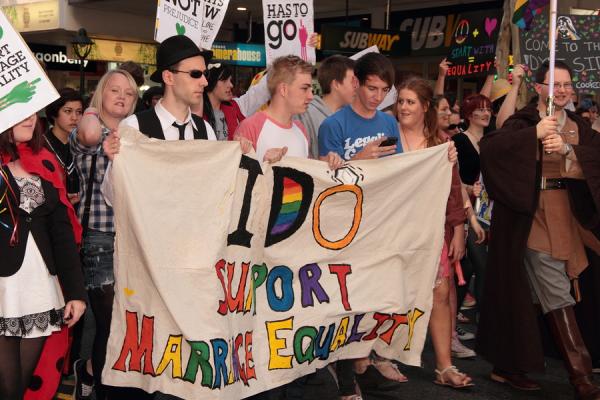
Sexual Tensions: Disagreements about Same-Sex Marriage in the LGBTQ Movement
There are now 14 countries around the world where same-sex marriage is legal and it is also legal in parts of Mexico and the United States. Across the world, activists continue to expend considerable energy in lobbying and campaigning for the cause in the face of continued vigorous conservative and often religious opposition. It seems, however, that the tide is turning. Polls in these, and other, countries have demonstrated a consistently rising level of public support for same-sex marriage across political ideologies, genders, ethnicities, class and age.
Yet, the rising global swell of support obscures a highly significant and pivotal tension, one on which communication scholarship can shed considerable insight, and that is the continued debate and discussion within LGBTQ circles as to whether gay marriage is an appropriate goal for the movement. A recent study in England, for example, highlighted that only 40% of people who identified as LGBTQ in the UK thought of gay marriage as a priority, and only half thought of it as personally relevant to them. In New Zealand, where I live, a 2007 survey showed that nearly as many LGBTQ people supported the abolition of marriage altogether as did those who supported the legalisation of same-sex marriage.
Arguments from pro-marriage activists have, with some success, framed marriage as a human and civil right, and are based on the need for inclusivity, dignity and full social participation. Radical activists like Lisa Duggan have argued, on the other hand, that queer participation in the institution of marriage at a moment when marriage itself is becoming less of a foundation for family life, offers a highly truncated vision of social change, and will ultimately reinforce an increasing sense of conservatism in what was once a vibrantly progressive movement. Others argue that the sheer amount of resources that activists have expended on the gay marriage issue has detracted from more pervasive issues of homophobia and bigotry that vulnerable queer groups such as youth, women, people of colour or the elderly, continue to face on a daily basis.
Communication scholarship provides some compelling insights on this important tension. We know, for example, that social movements themselves have historically been highly segmented, so the fact that radical flanks thrive alongside the larger LGBT movement is not in and of itself surprising. Communication researchers have shown that, as they age and become part of the status quo, social movements rely increasingly on their communicative relationship with their radical flanks to reinforce progressive ideologies, refresh their democratic practice and ensure the continued efficacy of the movement. We also know that several other “mature” social movements in the west, such as the feminist movement, have taken decades to develop productive tensional relationships with their radical flanks. Now, 44 years after Stonewall, the uprising in New York that sparked the rise of the LGBT liberation movement, the pivotal issue is how mainstream activists choose to engage with the complex questions about marriage raised by their radical counterparts instead of dismissing them as naysayers or party poopers who are playing into the hands of conservatives.
Not only does work in communication scholarship help identify the importance of intra-movement debates over marriage, communicative analyses of same-sex marriage also keep the debate alive, raising crucial questions for the broader movement on marriage to engage with. This was certainly the case in the most recent issue of the Journal of International and Intercultural Communication, which I edit, and which featured the first ever issue devoted to queer communication studies in a National Communication Association publication. This issue, titled “Out of Bounds,” is superbly edited by Karma Chávez and is devoted to exploring the potential queer studies offers intercultural communication studies. Given the currency of same-sex marriage debates, it was naturally a feature of the special issue.
Two points made about marriage in the special issue help illuminate the kinds of productive interchanges that radical and mainstream activists might have about same-sex marriage. First, Riley Snorton’s essay “Marriage Mimesis” shows how constructing marriage as a civil right can sharply miscast other minorities—in this case, African-Americans—as homophobic and “backward.” This in turn raises provocative questions about how the queer movement could imagine marriage in terms of social justice without treating it as a mimicry of other kinds of rights, but imagining it as a new kind of justice in and of itself; a question taken up in great detail by activist groups such as Against Equality.
Second, six scholars in a multifaceted dialogue about everything from the meaning of the word ‘queer’ to celebrities coming out, also critiqued marriage as a bourgeois patriarchal institution. Their discussion invites us to consider multiple historical meanings of marriage itself. Historians tell us that marriage has meant different things in different societies. Indeed, even today the rights and benefits accorded to marriage vary significantly across nations: while in the United States there are 1,138 rights and benefits that in effect exclude same-sex couples, in Aotearoa, New Zealand, there is only one: the right to adopt children as a couple. This in turn raises a critical question about what might be culturally specific rather than culturally universal about the notion of marriage being advocated globally by the same-sex marriage movement.
How these, and other, questions play out within the movement is of crucial significance in determining the future(s) of the LGBTQ movement itself. At worst, legalizing same-sex marriage could result in the LGBT movement believing that it has met its goals and dissolving altogether, thereby leaving a great many injustices unaddressed. At best, however, same-sex marriage can play a crucial reformative role in a broader process of social transformation and democratization. Whether it does this or not, however, is much more a matter for activists and the movement itself, rather than the forces that oppose it.

